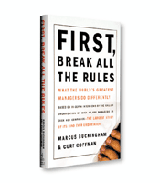My Notes on “First, Break All The Rules” by Marcus Buckingham:
Help employees become more of who they already are. Treat each person differently. Make employees close friends. Accept that you can’t change people, all you can do is facilitate.
The Twelve Questions
- Do I know what is expected of me at work?
- Do I have the materials and equipment I need to do my work right?
- At work, do I have the opportunity to do what I do best every day?
- In the last seven days, have I received recognition or praise for good work?
- Does my supervisor, or someone at work, seem to care about me as a person?
- Is there someone at work who encourages my development?
- At work, do my opinions seem to count?
- Does the mission/purpose of my company make me feel like my work is important?
- Are my co-workers committed to doing quality work?
- Do I have a best friend at work?
- In the last six months, have I talked with someone about my progress?
- At work, have I had opportunities to learn and grow?
What Great Managers Know
Companies don’t have one culture. Companies have as many cultures as it does managers.
Great managers don’t bemoan differences and try to grind them down. Instead they capitalise on them. They try to help each person become more and more of who he already is.
People don’t change that much.
Don’t waste time trying to put in what was left out.
Try to draw out what was left in.
That is hard enough.
Great managers look inward. They look inside the company, into each individual, into the differences in style, goals, needs, and motivation of each person. These differences are small, subtle, but great managers need to pay attention to them. These subtle differences guide them toward the right way to release each person’s unique talents into performance.
Great leaders, by contrast, look outward. They look out at the competition, out at the future, out at alternative routes forward. They focus on broad patterns, finding connections, cracks, and then press home their advantage where the resistance is weakest. They must be visionaries, strategic thinkers, activators.
Conventional wisdom encourages you to:
- Select a person… based on his experience, intelligence, and determination
- Set expectations… by defining the right steps
- Motivate the person… by helping him identify and overcome his weaknesses
- Develop the person… by helping him learn and get promoted
What great managers do:
- When selecting someone, they select for talent… not simply experience, intelligence, or determination
- When setting expectations, they define the right outcomes… not the right steps
- When motivating someone, they focus on strengths.. not on weaknesses.
- When developing someone, they help him find the right fit… not simply the next rung on the ladder
The First Key: Select For Talent
The power of skills and knowledge is that they are transferable from one person to another. Their limitation is that they are often situations-specific – faced with an unanticipated scenario, they lose much of their power.
In contrast, the power of talent is that it is transferable from situation to situation. Given the right stimulus, it fires spontaneously.
The limitation of talent, of course, is that it is very hard to transfer from one person to another. You cannot teach talent. You can only select for talent.
The Second Key: Define Right Outcomes
Define the right outcomes and then let each person find his own route toward those outcomes.
In your attempts to get your people to perform, never try to perfect people. The temptation may be captivatingly strong, but you must resist it. It is a false god. What looks like a miraculous cure-all is actually a disease that diminishes the role, demeans the people, and weakens the organisation.
Levels of Customer Satisfaction
- Accuracy (easy to meet, easy to steal)
- Availability (easy to meet, easy to steal)
Both are easy to meet and easy to steal. Both can only prevent customer dissatisfaction. Accuracy is demanded and expected.
- Partnership
- Advice
These are harder to meet and harder to steal. Forcing employees to follow required steps only prevent customer dissatisfaction. You must select employees who have the talent to listen and to teach, and then you must focus them toward simple emotional outcomes like partnership and advice.
Manage by Exception
Remember the Golden Rule? “Treat people as you would like to be treated.” The best managers break the Golden Rule every day. The would say don’t treat people as you would like to be treated. Instead, treat him as he would like to be treated. Just ask your employee about her goals: What are you shooting for in your current role? Where do you see your career heading? What personal goals would you feel comfortable sharing with me? How often do you want to meet to talk about your progress?
Spend the most time with your best people
Investing in your stragglers appears shrewd, yet the most effective managers do the opposite. They spend the most time with their most productive employees. They invest in their best.
For great managers, the core of their role is the catalyst role: turning talent into performance. So when they spend time with an employee, they are into fixing or correcting or instructing. Instead they are racking their brains, trying to figure out better and better ways to unleash that employee’s distinct talents:
- They strive to care out a unique set of expectations that will stretch and focus each individual
- They try to highlight and perfect each person’s unique style. They draw his attention to it. They help him understand why it works for him and how to perfect it.
- And they plot how they, the manager, can run interference for each employee, so that each can exercise his or her talents even more freely. Grease the administrative wheels so that nothing gets in their way.
“No News” kills behaviour
Great managers know that the less attention they pay to the productive behaviours of their superstars, the less of those behaviours they will get. Since human beings are wired to need attention of some kind, if they are not getting attention, they will tend, either subconsciously or consciously, to alter their behaviour until they do.
Investing in your best is the only way to achieve excellence
Don’t use average to estimate the limits of excellence. You will drastically underestimate what is possible. Focus on your best performers and keep pushing them toward the right-hand edge of the bell curve. It is counter-intuitive, but top performers, have the most potential for growth.
The difference between a non-talent and a weakness
Great managers don’t ignore weaknesses. As soon as they realise that a weakness is causing poor performance, they switch their approach. There are only three possible routes to helping the person succeed:
- Devise a support system (eg Rolodex for the forgetful, chicken in packs of 6 for intellectually disabled KFC worker)
- Find a complementary partner (eg if Bob is crap at paperwork, give it to a peer who is the best and fastest and likes it)
- Find an alternative role
The Fourth Key: Find the right fit
Broadbanding for pay. For each role, you define pay i broad bands or ranges, with the top end of the lower-level role overlapping the bottom end of the role above
Talents
Striving Talents
- Achiever: A drive that is internal, constant, and self-imposed
- Kinesthetic: A need to expend physical energy
- Stamina: Capacity for physical endurance
- Competition: A need to gauge your success comparatively
- Desire: A need to claim significance through independence, excellence, risk, and recognition
- Competence: A need for expertise or mastery
- Belief: A need to orient your life around certain prevailing values
- Mission: A drive to put your beliefs into action
- Service: A drive to be of service to others
- Ethics: A clear understanding of right and wrong which guides your actions
- Vision: A drive to paint value-based word pictures about the future
Thinking Talents
- Focus: An ability to set goals and to use them every day to guide actions
- Discipline: A need to impose structure onto life and work
- Arranger: An ability to orchestrate
- Work Orientation: A need to mentally rehearse and review
- Gestalt: a need to see order and accuracy
- Responsibility: A need to assume personal accountability for your work
- Concept: An ability to develop a framework by which to make sense of things
- Performance Orientation: A need to be objective and to measure performance
- Strategic Thinking: An ability to play out alternative scenarios in the future
- Business Thinking: The financial application of the strategic thinking talent
- Problem Solving: An ability to think things through with incomplete data
- Formulation: An ability to find coherent patterns within incoherent data sets
- Numerical: An affinity for numbers
- Creativity: An ability to break existing configurations in favour of more effective/appealing ones
Relating Talents
- Woo: A need to gain the approval of others
- Empathy: An ability to identify the feelings and perspectives of others
- Realtor: A need to build bonds that last
- Multi-relator: An ability to build an extensive network of acquaintances
- Interpersonal: An ability to purposely capitalise upon relationships
- Individualised Perception: An awareness of an attentiveness to individual differences
- Developer: A need to invest in others and to derive satisfaction in so doing
- Stimulator: An ability to create enthusiasm and drama
- Team: A need to build feelings of mutual support
- Positivity: A need to look on the bright side
- Persuasion: An ability to persuade others logically
- Command: An ability to take charge
- Activator: An impatience to move others to action
- Courage: An ability to use emotion to overcome resistance
